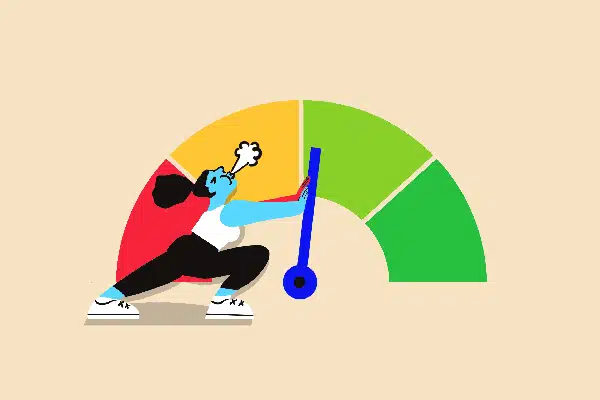The Recession Is Already Having an Impact on Americans' Credit Scores

With the U.S. officially declaring a recession and jobs numbers still hitting breathtakingly bad levels, it's clear that the coronavirus crisis is far from over. People are going to be feeling the financial effects of the pandemic for months, and possibly years, to come.
That's especially true when it comes to credit scores, which are calculated over time and used by lenders to evaluate a person's trustworthiness. Several factors go into your credit score, but there are two in particular that may be taking a hit right now. Payment history — which is how often you pay your bills on time — and credit utilization — which is how much of your available credit you're using at any given time — could both be impacted by what’s happening with the economy.
The good news? At least one expert says it's possible to maintain, and even improve, your credit score during the coronavirus crisis.
Rob Levy, the vice president of the Financial Health Network, a nonprofit financial consultancy in Chicago, says the situation is actually not quite as bleak as it could be. People’s expenses are down because they haven’t been going out and spending money. Several student loans aren’t requiring customers to make regular payments. Meanwhile, increases in unemployment insurance and the CARES Act stimulus payments are helping Americans make ends meet.
However, he surfaced some survey data that he said paints “a worrisome picture.” A third of Americans say they’re earning less due to the coronavirus outbreak. They’re using up their cushions, spending their savings and carrying higher credit card balances as they try to make it through these tough times. Also, according to the increasingly alarming headlines, the U.S. is approaching a cliff.
“If unemployment continues (even amidst some re-opening), the federal stimulus ends, expenses start to rise, forbearance requirements end, and/or banks become less flexible with their loans, you could see millions of people start to miss payments or take out additional debt, and credit scores start to tumble,” Levy says.
This happened last recession, as well. According to FICO data, lenders saw jumps in the lowest and highest segments of credit scores early on. The middle range of scores (think 550ish to 700ish) didn’t rise until after 2008.
There’s also some shady stuff going on behind the scenes. Credit card issuers are becoming less risk-tolerant because of the current economic downturn. CompareCards found that a quarter of customers saw their credit limits decreased or had their cards completely closed — without them asking — in April. Another survey discovered the average credit limit for a new card is down over $1,000 from last year.
This matters because if your credit limit gets reduced but you keep your same amount of spending, your utilization ratio will go up — and your score could go down. If this happens, Levy says you should try to pay down debt in proportion to the line decrease.
Otherwise, it’s crucial that you stay the course as far as your credit is concerned.
“If the goal is to maintain your credit score, the standard advice hasn’t changed,” Levy says. “Pay all your bills on time, pay at least the minimum on your credit cards, and keep your credit utilization to less than 30% of your available credit.”
Despite the sneaking around, lenders are being relatively understanding during the pandemic. If you can’t afford to pay a bill because of the coronavirus, you can call your card issuer and ask for forbearance. You can also try to negotiate a lower interest rate. But you should make a point of specifically asking whether the special considerations will impact your credit score.
“Be cautious in using up existing credit lines or applying for new ones,” Levy says. “Try to seek an arrangement where you will continue to be reported as ‘current’ on your payments, and ask for reduced payments if possible.”
Bottom line: You can protect and/or improve your credit score right now by paying bills on time, keeping an eye on your credit utilization ratio and talking to lenders.
Levy says it’s too soon to tell whether creditors will become more or less lenient going forward as a result of the coronavirus outbreak — but that credit scores could be on their way out anyway. Some companies have begun looking at data points like cash flow and utility bill payments to evaluate potential borrowers.
“The credit score was always an imperfect method of predicting creditworthiness, especially for underserved consumers,” he adds. “Now that the crisis has shown how many factors beyond a consumer’s control … impact their ability to pay debts, I expect this trend of looking at the more holistic view to continue.”
More from Money:
The Average Credit Score Just Hit a New High. See How Yours Stacks Up
Free Credit Reports Are Now Available Weekly. Here’s How To Pull Yours
A Mistake Caused Credit Scores to Drop for Tons of Student Loan Borrowers
